By Jae-Ha Kim
Substack
February 13, 2016
![]() Deok Sun (played by Lee Hye-Ri)
Deok Sun (played by Lee Hye-Ri)
Jung Hwan (played by Ryu Joon-Yul)
Sun Woo (played by Go Kyung-Pyo)
Taek (played by Park Bo-Gum)
One of the things that I really enjoy about the “Answer Me” trilogy is the lifelong friendships that the characters share. Whereas the first two series focused primarily on the teenagers, “Answer Me 1988” delves into the backstories of their parents as well.
And that, to me, made this chapter a standout. The parents’ storylines were as interesting — if not more — than the who-will-she-marry premise that is predominant in each of the “Answer Me” installments.
Like its predecessors, “Answer Me 1988” has us wondering which man the female lead will choose. We know that cute and friendly Deok Sun will marry one of her best friends. Will it be stony-faced Jung Hwan, who has a difficult time showing his emotions, or sweet and gentle Taek, who is an internationally-ranked baduk champion?
Unlike the previous two series where the actors played both the younger and older versions of themselves, the older versions here are portrayed by actors in their 40s. It’s a nice little twist.
To be honest, I was underwhelmed by the first episode and wasn’t sure I wanted to invest any more time watching all 20 episodes (which ranged from 90 minutes to almost two hours each). I’m glad I did, though, because by the second episode, I was hooked. Originally aired on the Korean cable network tvN, “Answer Me 1988” had the highest cable rating (to date).
The characters were written as more than just teenage caricatures. I also I recognized the suffering that the parents went through from my own memories of my parents’ lives.
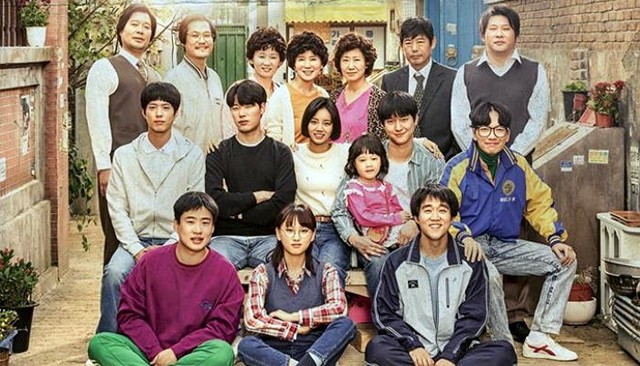
Girl’s Day vocalist Lee Hye-Ri is adorable as Deok Sun. Though her acting skills aren’t comparable yet to some of the veterans (for instance, when she cries, it sounds more like a forced, irritating wail), she does a fine job of portraying a tomboy who’s anxious to find her first love.
The series shows the importance of education and how hard it is for students to get accepted into college. But there was also the underlying message that college isn’t for everyone, and that those who don’t make it into one of the SKY schools still have a chance to lead successful lives. (SKY is the acronym for the top three Korean universities: Seoul National University, Korea University, Yonsei University.)
Given the enormous pressure that South Korean students are under today to succeed at all costs, it was heartening to see that the academic underachievers in this series all ended up doing well for themselves.
The storyline moves quickly from Episode 17, where the cast members flash forward from teenagers to their mid-20s. In episode 18, a fan favorite from “Answer Me 1994” makes a cameo.
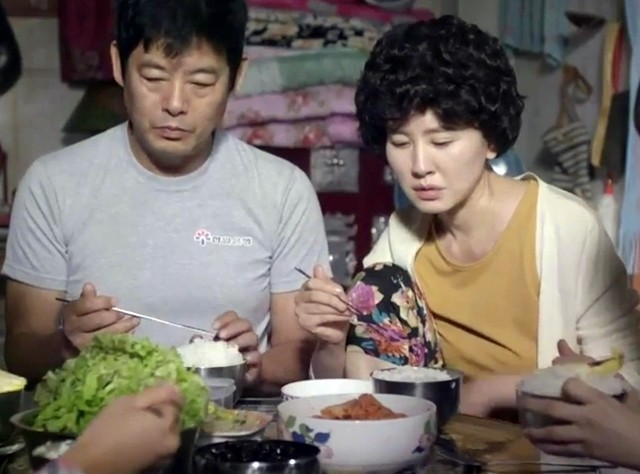
As in the previous two installments, Sung Dong-il (above, left) and Lee Il-hwa return as the female lead’s parents. (Fans will recognize that the characters they play in the “Answer Me” trilogy all share the actors’ real-life names.) Both actors are wonderful in their roles, but some fans have expressed irritation at Sung’s portrayal, which often has him bellowing at his children. (To see him play a quieter version of a dad, watch his understated performance in “Miss Granny.”)
Beneath his gruff exterior, Dong-il has a good heart. Though his own family is struggling to make ends meet, he is incapable of saying no to anyone who needs money. He would come home with useless gadgets that he purchased from the less fortunate. Even though his wife chided him for it, reminding him that the money he spent on others was literally taking things away from their own children, he wanted to help others as much as he could.
From the tight-curled pahmas (that’s perms, to you) on the ajummas, the need to share food with friends and the constant worrying about money, this series captures a segment of Korean culture that is so familiar — even to those of us who grew up overseas.
Jung Hwan’s parents grew up in poverty. His family lived in a small, one-bedroom rental property until his older brother bought a winning lottery ticket. But even though they were now wealthy, his dad can’t bring himself to buy anything nice for himself. When his wife forces him to buy a new car, he proudly comes home with a new used car instead.
When you grow up so poor that you can’t imagine where your next meal will come from, buying a designer coat is off limits. I remember my own parents never spending any money on themselves, even after they had saved a comfortable nestegg. The only luxuries they enjoyed were the ones we bought for them.
The series also touched on something that seems insane to me: forced retirement by the workers’ late 40s — a time when many parents haven’t finished sending their children to college. Duk Seon’s father, who only had a high school education, toiled away at the bank long after everyone else went home. He knew that without a college degree, he had more to prove to his employers. Still, he was forced to retire before his 50th birthday.
The same for another boy’s mother, who was a high-powered business executive. Later, we see her taking a job as a grocery store cashier. While some would say that it isn’t realistic for her to take a low-paying job, this is commonplace.
I remember that during a recent trip to Korea, one of our very-cultured, very well-educated drivers had once been an executive at an airline. When he was pushed out of the workforce, he reinvented himself as a livery driver. Because he could speak several languages, he drove visiting foreigners around.
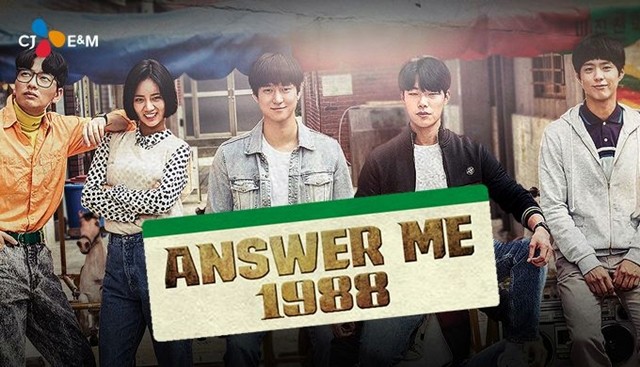
Timeline:
Though each series stands on its own, I would recommend that — if you have the time — you watch this trilogy in the order they were released: “Answer Me 1997” (released in 2012); “Answer Me 1994” (released in 2013) and then “Answer Me 1988” (which aired from Nov. 6, 2015 through Jan. 6, 2016). You’ll appreciate the meta moments and won’t be spoiled as to who gets married in the earlier productions.
Meta moments:
Kim Sung Kyun, who played awkward country boy Samcheonpo in “Answer Me 1994,” returns to this series as Jong Hwan’s father. Jung Woo also returns for a few minutes of screentime, reprising his role of Trash.
The boys talk about how pretty actress Lee Mi-Yeon is. Lee is the actress who plays Deok Sun in her 40s.
Spoiler alert:
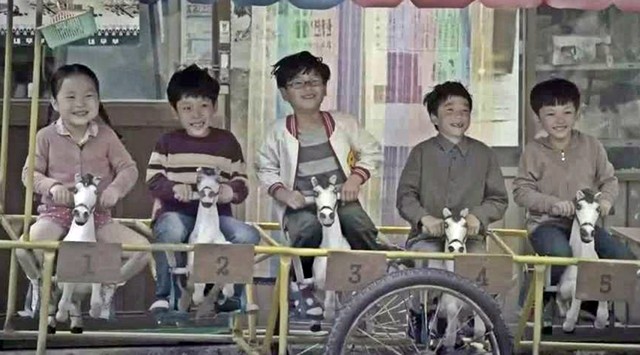
Though the premise is strong for Deok Sun to choose Jung Hwan, she ends up married to Taek. Early in the first episode, there was a clue that they would be together. She sees him outside drinking milk and teasingly tells him to grow strong and then marry her when they’re adults.
We never get to see Deok Sun’s wedding to Taek. We do get to watch the emotional ceremony between Bora and Sun Woo (Deok Sun’s older sister and her childhood friend, respectively).
Deok Sun becomes a flight attendant, which is still a coveted job in South Korea today among college graduates. Jung Bong (who took more than seven years to get accepted by a college) becomes a celebrity chef. Like Deok Sung, Dong Ryong — the boy above in the middle — was a failure at school. I wondered what would become of him and was happy to see he became a successful restrateur.
Airdates:
TVN’s 20-episode series aired from November 6, 2015 through January 6, 2016.
My reviews of the rest of the trilogy:
“Answer Me 1997″ / “Reply 1997”
“Answer Me 1994″ / “Reply 1994”
@2016 Jae-Ha Kim | All Rights Reserved
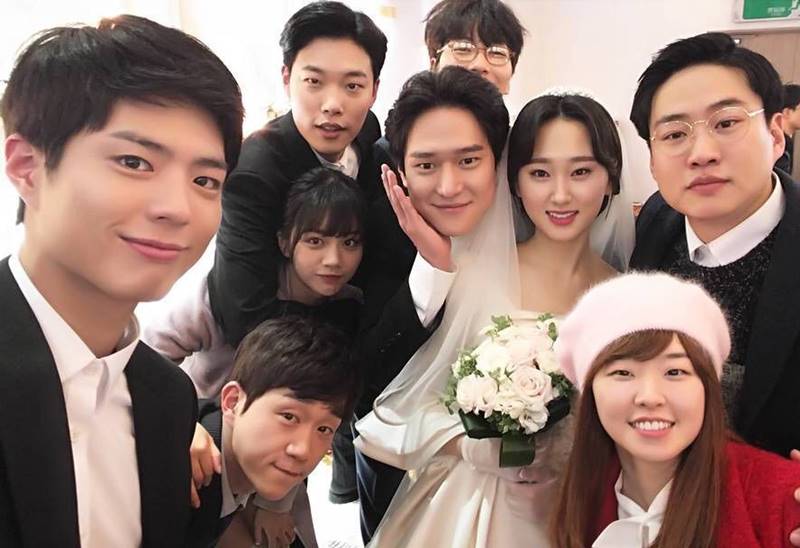
This was my favorite K-drama ever. I cried through most of the series. Lol
I thought the same thing after the first episode. I actually took a month before seeing the second episode.
I was totally not aware of who she’d end up marrying! I was surprised, but I did like the outcome anyway.
I cried like a baby with the wedding scene. haha. The relationship between Bo Ra and Sun Woo was my favorite!!
I agree with Duk Seon’s cry!
Thanks for your comments on my review. For whatever reason, I wasn’t notified of your two comments… Ugh. Technology! I agree with everything that you wrote… Great minds think alike?
I hope you’re having a nice summer!